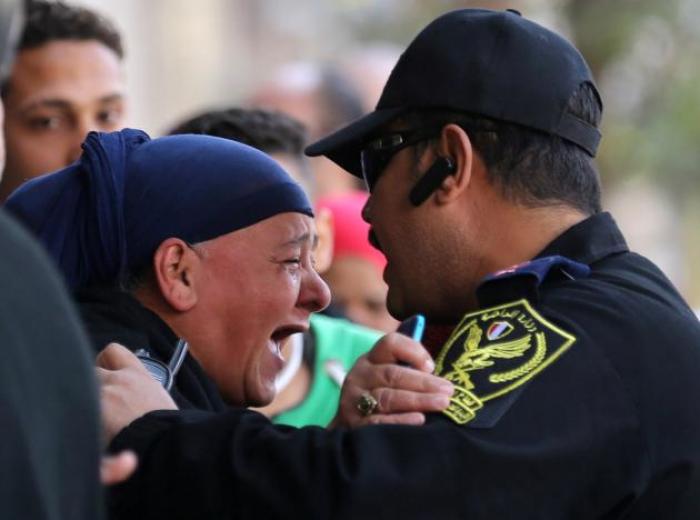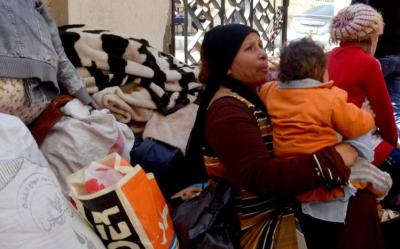Fleeing Egyptian Christians Say Gov't Is 'Apathetic' About Protecting Them From ISIS

Egyptian Christians who recently fled their homes in the wake of a string of "targeted attacks" say they received an "apathetic" response from government authorities when looking for protection against radical Islamic extremists.
Hundreds of Christian families were forced to abandon their homes in the northern Sinai Peninsula following the murders of at least seven Christians in the coastal town of Al-Arish from Jan. 30 until Feb. 23.
According to Egyptian rights activists who spoke with the international non-governmental organization Human Rights Watch, families who have fled from Al-Arish and are now living west of the Suez Canal have said that the attacks carried out against the Christian community fit the mold of attacks previously carried about by Islamic State affiliates in Sinai.
Although IS (also known as ISIS or ISIL) has not claimed responsibility for the murders, the attacks coincided with a Feb. 19 video released by IS that showed a suicide bomber claiming responsibility for the deadly December attack on a cathedral in Cairo that killed 29 Christians and also calls Christians the group's "favorite prey."
"The recent attacks in al-Arish – and earlier killings there and in northern Sinai towns such as Rafah and Sheikh Zuwayd – are not communal, or provoked by a particular incident. Gunmen targeted Christians apparently not for who they were – a veterinary surgeon, pharmacist, teacher, shoe merchant – but apparently to frighten the small Christian communities to flee en masse," HRW Deputy Director for the Middle East and North Africa Division Joe Stork wrote last week. "And in the context of protracted fighting between Egyptian security forces and ISIS, to demonstrate Egypt's incapacity to protect lives and property."
Stork also wrote that families from Al-Arish told rights activists that it was only after Egyptian security officials displayed an "apathetic" response toward the safety and concerns of the Christian community that they decided to flee. The families added that they would love to return to their homes but don't believe that it is a possibility at this time.
"What does it mean when they say [security forces] are apathetic?" Stork asked in an interview with The Christian Post on Tuesday. "Well, they didn't see much response from the security forces to the attacks in terms of protection, in terms of capturing suspected perpetrators, etcetera."

Stork told CP that because HRW does not have much access to the Sinai region to conduct its own investigations, the organization is reliant upon Sinai-based rights activists for information. However, he feels that the claim that security forces are showing apathy toward the violence against Christian communities is credible.
"Obviously, we think it is quite credible, or else we wouldn't publish it at all," he said. "We are not in a position to make that judgment ourselves."
Stork noted that there have been instances in the past and in other parts of the country where police and security personnel have displayed an apathy toward protecting Christians from communal uproar in the Muslim community.
"In the communal violence that has occurred elsewhere in Egypt over the years, mainly in Upper Egypt where the Christians make up a larger percentage of the population, the response then has also been apathetic," Stork explained. "It has been in slightly different ways. In those cases, the authorities, it appears, are unwilling to take on communities of Muslims who are angry about one thing or another. So, they typically pressure the Christians involved in the disputes to sort of give in. This is something they call community mediation, but not much in the way of law enforcement."
While there was a string of Christian homicides in Al-Arish, Stork pointed out that most of the violence carried about by IS affiliates in Sinai is perpetrated against security forces, police and those accused of collaborating against the terror group.
HRW reports that as many as 100 fleeing Christian families are now located in Port Said and other towns to the West.
According to a statement released late last month by Coptic Bishop Anba Angaelos, the general bishop of the Coptic Orthodox Church in the United Kingdom, as many as 40 Christians across Egypt have been killed in various "targeted attacks" in the last three months. He added that extremists have also distributed flyers in some Egyptian villages, telling Christians to "leave or die."
"After the destruction of over 100 places of Christian ministry and worship in August of 2013, the bombing of various churches across the country in the last decade, and the targeted killing of clergy, families, women and children, purely for their faith, the community and individuals within it remain non-violent and resilient," Angaelos stressed. "Despite there being condemnation of these attacks by national government and authorities, there is yet to be a consistent robust and fair implementation of these same sentiments more regionally and locally."




























